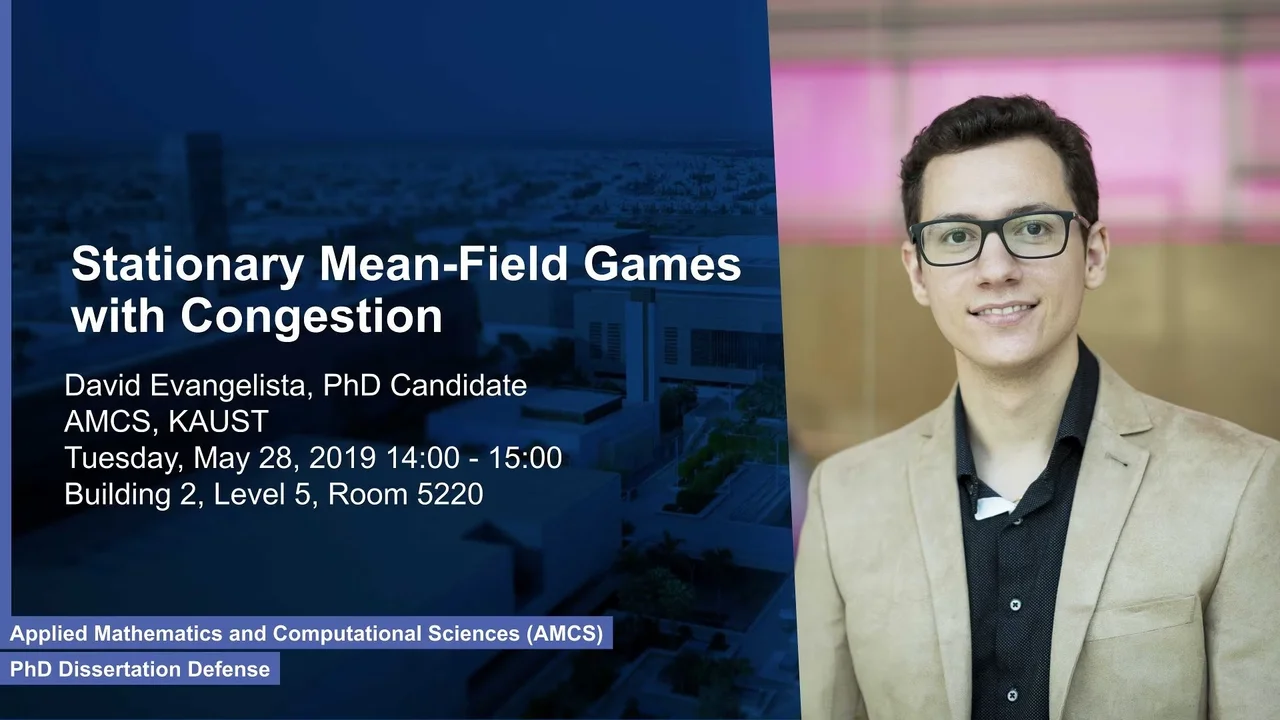
Stationary Mean-Field Games with Congestion
Mean-field games MFG are models of large populations of rational agents who seek to optimize an objective function that takes into account their state variables and the distribution of the state variable of the remaining agents. MFG with congestion model problems where the agents’ motion is hampered in high-density regions. First, we study radial solutions for first- and second-order stationary MFG with congestion on R^d. Next, we consider second-order stationary MFG with congestion and prove the existence of stationary solutions. Additionally, we study first-order stationary MFG with congestion with quadratic or power-like Hamiltonians.
Overview
Abstract
Mean-field games MFG are models of large populations of rational agents who seek to optimize an objective function that takes into account their state variables and the distribution of the state variable of the remaining agents. MFG with congestion model problems where the agents’ motion is hampered in high-density regions.
First, we study radial solutions for first- and second-order stationary MFG with congestion on R^d. The radial case, which is one of the simplest non one-dimensional MFG, is relatively tractable. As we observe, the Fokker-Planck equation is integrable with respect to one of the unknowns. Consequently, we obtain a single equation substituting this solution into the Hamilton-Jacobi equation. For the first-order case, we derive explicit formulas; for the elliptic case, we study a variational formulation of the resulting equation. For the first case, we use our approach to compute numerical approximations to the solutions of the corresponding MFG systems.
Next, we consider second-order stationary MFG with congestion and prove the existence of stationary solutions. Because moving in congested areas is difficult, agents prefer to move in non-congested areas. As a consequence, the model becomes singular near the zero density. The existence of stationary solutions was previously obtained for MFG with quadratic Hamiltonians thanks to a very particular identity. Here, we develop robust estimates that give the existence of a solution for general subquadratic Hamiltonians.
Additionally, we study first-order stationary MFG with congestion with quadratic or power-like Hamiltonians. Using explicit examples, we illustrate two key difficulties: the lack of classical solutions and the existence of areas with vanishing densities. Our main contribution is a new variational formulation for MFG with congestion. With this formulation, we prove the existence and uniqueness of solutions. Finally, we devise a discretization that is combined with optimization algorithms to numerically solve various MFG with congestion.
Brief Biography
David's research interests are in optimal control theory, nonlinear partial differential equations, MFG, and market microstructure. MFG is a framework to study interactions of a large number of indistinguishable players that play differential games. MFG has become an active research area with applications in financial and industrial engineerings, economics, crowd dynamics, and more. Moreover, market microstructure is an area of finance concerned on how trading mechanisms affect the price formation process. His interests range from active subjects of applied mathematics, such as MFG, to empirics of high-frequency finance. David aims at developing novel applications of optimal control and MFG theory to market microstructure, aligned with numerical, empirical, and practical aspects of financial markets.

